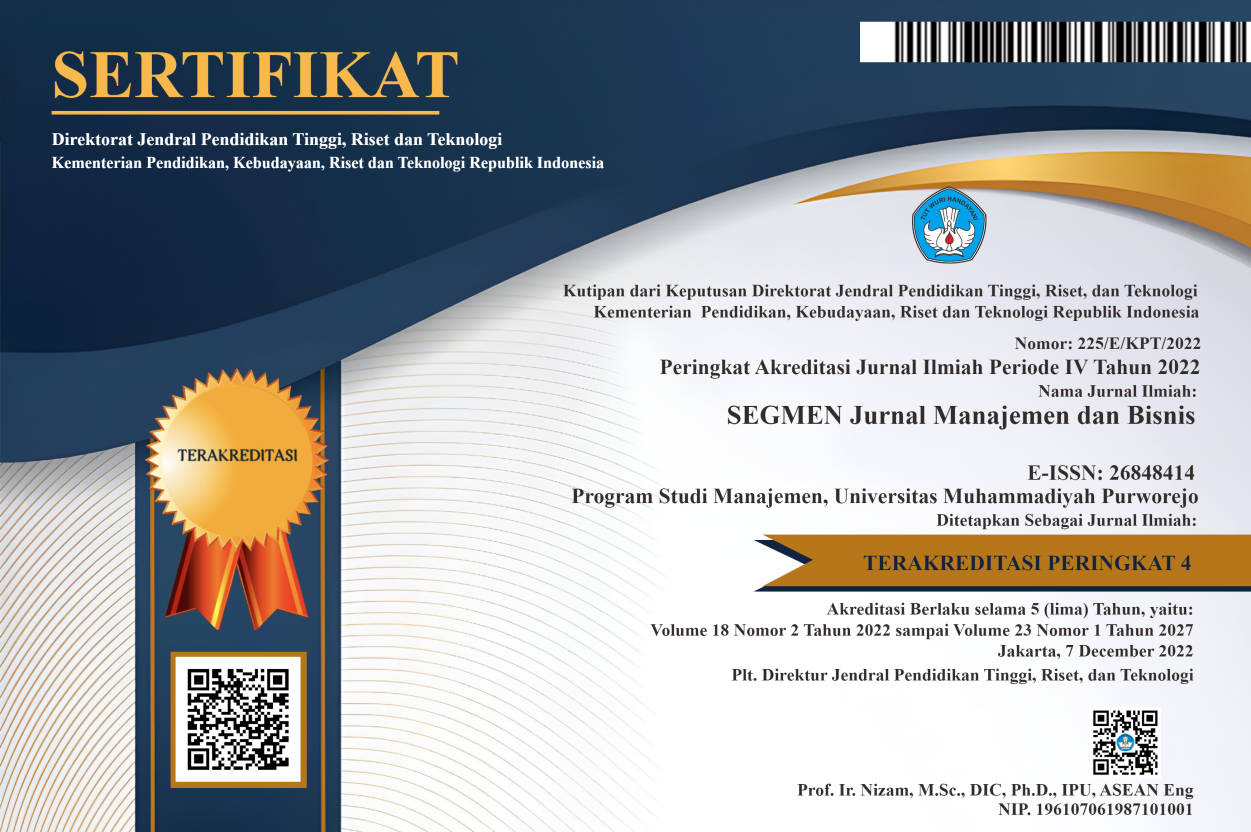ECONOMIC GROWTH, REGIONAL STUDY IN SOUTHEAST ASIA DIGITAL MARKETING
Abstract
This study aims to analyze the impact of the digital marketing sector on economic growth in the Southeast Asian region by using key indicators: broadband penetration and the number of people in the productive age group. These two variables are used to represent technological readiness and workforce capacity as drivers of digital-based economic growth.
The research employs a quantitative approach with secondary data from ten Southeast Asian countries (Indonesia, Malaysia, Singapore, Thailand, the Philippines, Brunei Darussalam, Cambodia, Vietnam, Laos, and Myanmar) covering the period from 2019 to 2023. The analysis technique used is panel data regression with the Random Effect Model (REM) approach and assumption testing using the OLS method. The results show that the broadband variable has a positive and significant effect on economic growth, with a coefficient of 0.981 and a significance level of 0.000. This indicates that high-speed internet access is a crucial catalyst for the growth of the digital sector and economic activities in the region. The variable representing the productive age population does not show a significant impact on economic growth, suggesting that the quantity of labor does not necessarily guarantee increased economic output unless accompanied by improvements in productivity and human capital quality
References
Annisa, Hannah, and Fatma Ulfatun Najicha. 2021. “KONSEKUENSI GEOPOLITIK ATAS PERDAGANGAN INTERNASIONAL INDONESIA.” Jurnal Global Citizen : Jurnal Ilmiah Kajian Pendidikan Kewarganegaraan 10(2).
Anon. 2024a. “ERIA-Economic Research
Instititute for ASEAN and East Asia.” Anon. 2024b. “Global Web Index.” Anon. 2024c. “UNCTAD Statistics.”
Dykas, Paweł, Tomasz Tokarski, and
‘Rafał Wisła. 2022. The Solow Model of Economic Growth.
Inekwe. 2013. “The Relationship between Real GDP and Non-Performing Loans: Evidence from Nigeria.” International Journal of Capacity Building in Education and Management (IJCBEM) 2(1).
Kaiser, M. Shamim, Juanying Xie, and Vijay Singh Rathore. 2021. “Information and Communication Technology for Competitive Strategies: Intelligent Strategies for ICT.” Lecture Notes in Networks and Systems 190(Ictcs).
Marolla, Cesar. 2018. Information and Communication Technology for Sustainable Development. McDonald, Peter. 2015. “Demographic Change: How, Why and Consequences.” in Change!: Combining Analytic Approaches with Street Wisdom.
Meidayati, Anis Wahyu. 2017. “Impact of Telecommunication Infrastructure, Market Size, Trade Openness and Labor Force on Foreign Direct Investment in ASEAN.” Journal of Developing Economies 2(2).
Nihil. 2015. Operasionalisasi Regresi Data Panel (Dengan Eviews 8). Vol. 4.
Nurkholis, Afid. 2018. “Teori Pembangunan Sumberdaya Manusia: Human Capital Theory, Human Investment Theory, Human Development Theory, Sustainable Development Theory, People Centered Development Theory.” INA-Rxiv.
Pentz, Chris D., and Lieze Ryke. 2021. “The Intention to Repurchase Apparel Online: A Case of South African Millennial Men.”
Poerna Wardhanie, Ayouvi, Althov Zhorif Naufal, and Sri Hariani Eko Wulandari. 2021. “Perancangan Strategi Digital Marketings Dengan Metode Race Pada Layanan Online Food Delivery Berdasarkan Perilaku Pelanggan Generasi Z.” Journal of Technology and Informatics (JoTI) 3(1).
Rauf, Abdul, Sardjana Orba Manullang, Tri Endi Ardiansyah, Fara Diba, Ilham Akbar, Robi Awaluddin,
Puji Muniarty, and Hamdan Firmansyah. 2021. Digital Marketing : Konsep Dan Strategi.
Schumpeter, Joseph. 2021. The Theory of Economic Development.
Sugiyono, D. 2016. Quantitative, Qualitative and R&D/Sugiyono Educational Research Methods (in Indonesian).
Todaro, Michael P., and Stephen C. Smith. 2006. “Pembangunan Ekonomi Jilid 1.” Economic Development.
Vahedi, Zahra, Lesley Zannella, and Stephen C. Want. 2021. “Students’ Use of Information and Communication Technologies in the Classroom: Uses, Restriction, and Integration.” Active Learning in Higher Education 22(3).
Widarjono, Agus. 2005. Ekonometrika : Teori Dan Aplikasi Untuk Ekonomi Dan Bisnis.
Copyright (c) 2025 Prasetya Tri Mahendra, Ika Novaliana

This work is licensed under a Creative Commons Attribution-NonCommercial 4.0 International License.









